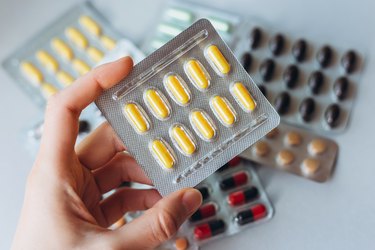
The body requires a certain amount of calories from food to survive and function properly. A decreased or complete loss of appetite can lead to insufficient calorie intake and can have detrimental effects on health. Cancer therapy, AIDS, depression or other medical conditions may contribute to a suppression of appetite, but medications are available that work to stimulate appetite.
Dronabinol
Video of the Day
Dronabinol is a prescription medication indicated to treat appetite loss in individuals with AIDS. It is a synthetic or man-made form of the compound THC. THC or tetrahydrocannabinol is the primary psychoactive substance of the cannabis or marijuana plant. Dronabinol has a variety of effects on the central nervous system, one of which being an appetite stimulant. According to the website RxList, dronabinol may stimulate appetite for 24 hours or longer after administration. Dronabinol may be habit forming and should only be used exactly as prescribed by a doctor. Common side effects include dizziness, mood changes, a euphoric or high feeling, anxiety and confusion.
Video of the Day
Megestrol acetate
Indicated for the treatment of weight loss and loss of appetite in individuals with AIDS, megestrol acetate is a derivative of the hormone progesterone, a female-hormone involved in ovulation and menstruation. According to the website RxList, the exact mechanism by which megestrol acetate increases appetite is unknown at this time. The most common side effects of megestrol acetate include nausea and vomiting, dizziness and weakness, headache and sleep troubles. Women may also experience changes in menstrual bleeding.
Somatropin
Somatropin is a synthetic form of human growth hormone which plays a role in the bone and muscle growth in the body. Generally used as a treatment for growth failure in children, somatropin is also indicated to stimulate weight gain in individuals with AIDS or short bowel syndrome. Many different brand name medications are available that are synthetic versions of human growth hormone. Somatropin is given as an injection and the most common side effects include headache, pain or irritation at the injection site, breast swelling, joint pain and gastrointestinal upset, according to the website RxList.